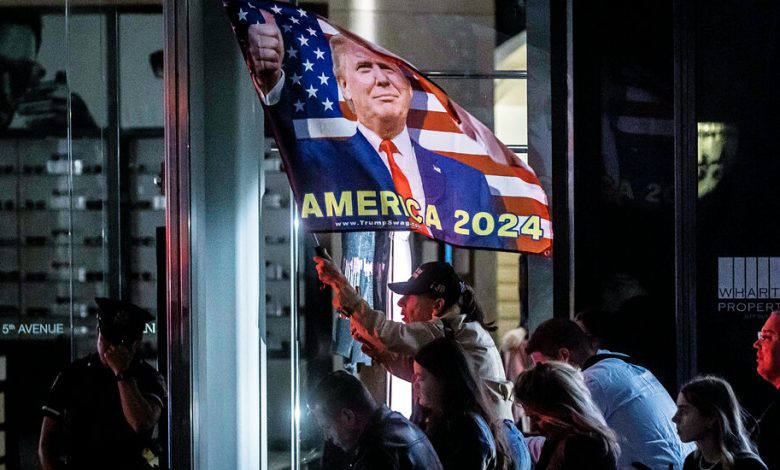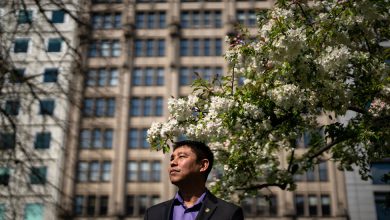As Trump’s Legal Woes Have Escalated, So Have His Violent Remarks

Former President Donald J. Trump had a lot to say on the first day of the fraud trial against him and his company. Speaking to reporters at a Manhattan courthouse on Monday, he dismissed the judge as a “rogue” justice and said he did not “think the people of this country are going to stand for it.” And he focused on the official who filed the lawsuit against him, New York’s attorney general, Letitia James.
“This is a disgrace,” he said, “and you ought to go after this attorney general.”
The remark urging people to “go after” a top elected official in New York, by a former president whose invective has become a familiar backdrop of American life, was part of a pattern of increasingly sharp language from Mr. Trump.
Days earlier, he told hundreds of Republican activists in California that shoplifters should be shot. Not long before that, he insinuated that the military general he personally appointed as chairman of the Joint Chiefs of Staff should be executed for treason.
Since he first became a political candidate in the 2016 presidential race, Mr. Trump has glorified violence, suggesting he wanted to hit a protester and offering to pay the legal fees if his supporters struck protesters at his rallies. But as Mr. Trump has been indicted four times in four jurisdictions in the last five months, and now faces a civil fraud trial in New York, his violent speech has escalated.
Mr. Trump’s public remarks, whether online, in interviews or at rallies, have always had the potential for incendiary effects. A number of defendants prosecuted over the attack on the Capitol on Jan. 6, 2021, said they believed they were acting on Mr. Trump’s orders.
Part of what has changed is that his violent remarks now come at a time when the indictments have already stoked anger among his supporters and when attacks against institutions, judges and prosecutors around the country have increased. The special counsel, Jack Smith, has asked the federal judge overseeing the case in which Mr. Trump was charged with trying to subvert the democratic process in 2020 for a limited gag order because of his threatening statements against witnesses, prosecutors and others.
If the judge grants the gag order, it may only increase Mr. Trump’s appeal with his supporters: The former president, who claims to be a victim of political persecution, is finding a receptive audience for his increasingly menacing language at campaign appearances. Mr. Trump has always leavened his sharpest words with humor, which can have a softening effect, a pattern that has continued with his recent appearances.
At the G.O.P. convention in California last week, Mr. Trump mocked Paul Pelosi, the husband of Representative Nancy Pelosi, the former House speaker. Last year, Mr. Pelosi was brutally attacked in his home by a man who was wielding a hammer and who was motivated by right-wing conspiracy theories. “We’ll stand up to crazy Nancy Pelosi, who ruined San Francisco,” Mr. Trump said, before pausing and looking out at the crowd.
“How’s her husband doing, by the way, anybody know?” he deadpanned, drawing laughter and a smattering of applause. “She’s against building a wall at our border even though she has a wall around her house, which obviously didn’t do a very good job.”
Mr. Trump also talked about mass shoplifting incidents at stores in major cities. Republicans have focused on the shoplifting sprees as examples of lawlessness, saying the punishment should be severe.
“Very simply, if you rob a store, you can fully expect to be shot as you are leaving that store,” Mr. Trump told the crowd at a hotel ballroom in Anaheim. The audience cheered wildly. “Shot!” he added for emphasis.
The moment was Mr. Trump’s biggest applause line of the night. Attendees rose to their feet and chanted: “Trump! Trump! Trump!”
A spokesman for Mr. Trump declined to comment.
Mr. Trump holds relatively few campaign appearances compared with his rivals running for the Republican presidential nomination. And several of his recent public appearances have been connected to his indictments and court-mandated appearances.
That reality, in which his legal travails and his political campaign are merging into one, has meant that Mr. Trump’s defenses of himself — and his calls for supporters to refuse to “stand” for what he insists is a broad miscarriage of justice — are front and center in nearly every statement he makes.
Mr. Trump voices most of his anger these days in a far less visible forum: Truth Social, the social media website he started in early February 2022, just over a year after he was barred from X, formerly known as Twitter. His X account was reinstated by the new owner, Elon Musk, but he has used it only once: to post the mug shot that officials took when he was arrested in Fulton County, Ga., in connection with his efforts to overturn his 2020 election loss in the state.
On Truth Social, he criticizes the prosecutors, reposts videos and memes attacking his critics and rivals, and blasts out clips from his own speeches. In one recent clip of a speech he gave in Michigan, he complained that if he hadn’t run for president, he “would have had the nicest softest life” but that “instead, I have to beat these lunatics up all day long.”
It was on Truth Social where Mr. Trump made the comment about the former chairman of the Joint Chiefs of Staff, Gen. Mark A. Milley. The general was increasingly critical of Mr. Trump as his role came to an end, an extraordinary rebuke of a former president by a senior military leader.
In a Truth Social post, Mr. Trump wrote of the general’s calls with his Chinese counterpart, “This is an act so egregious that, in times gone by, the punishment would have been DEATH!”
At a ceremony honoring his departure, General Milley said, “We don’t take an oath to a country, we don’t take an oath to a tribe, we don’t take an oath to a religion, we don’t take an oath to a king or a queen, or to a tyrant or a dictator, and we don’t take an oath to a wannabe dictator.”




